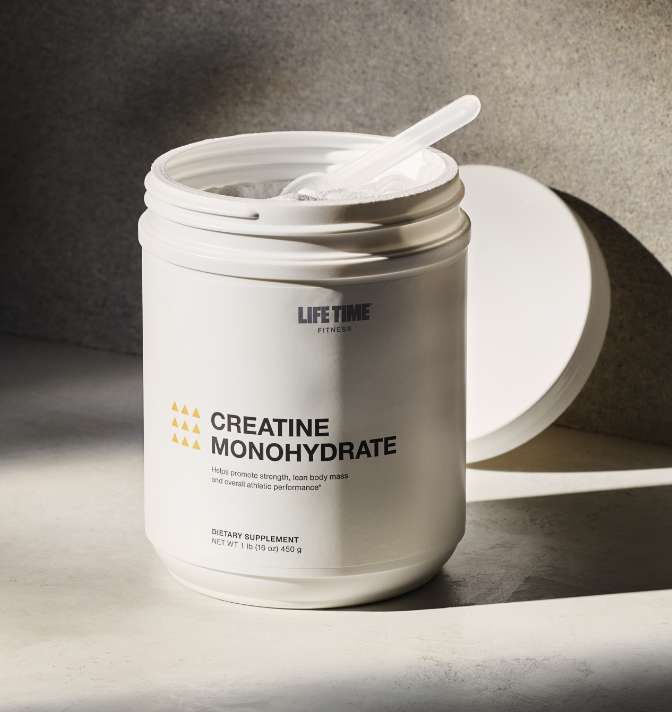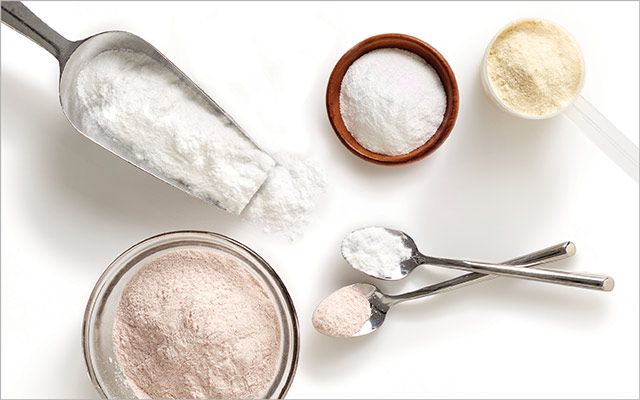For many, the initial reaction to the thought of supplementing with creatine is one of concern and skepticism.
“I’m not trying to be a bodybuilder.”
“Isn’t that a steroid?”
“It’s bad for your kidneys.”
Although creatine has been successfully used in the bodybuilding community for years, aside from a few exceptions, it’s also appropriate for nearly everyone in the general population.
Creatine is one of the most underrated, effective, well-researched, and safest supplements on the market, and offers a whole host of potential health benefits. (And it is not a steroid, and does not negatively impact those with healthy kidney function.)
Learn why creatine is not just for bodybuilders — and why it might be right for you.
A Technical Look at Creatine
Creatine can be obtained through your diet or supplementation. It can also be made by your body in limited quantities, when the amino acid arginine is added to glycine and then goes through a process called methylation. In diet, the richest food sources of creatine come from meat, fish, and poultry.
Most of your body’s creatine stores are located in your muscles in the form of phosphocreatine, which is creatine attached to a phosphate group. It can also be found in smaller amounts in your liver, kidneys, and brain.
When your muscles need to produce energy, a phosphate group is added to a molecule called ADP (adenosine diphosphate, which is adenosine with two phosphate groups) to make ATP (adenosine triphosphate, which is adenosine with three phosphate groups). The more phosphocreatine you have available, the more phosphate donors you have, which results in the production of more ATP — and energy.
Creatine intake increases the phosphocreatine stores in your muscles and brain, which is almost universally beneficial.
The Health Benefits of Creatine
Due to its support of energy production, creatine is well-known for its ability to positively impact power output, along with muscle force and mass. It is also commonly known for supporting protein synthesis and reducing fatigue. Although those are the most widely recognized effects, creatine may provide additional benefits to your health as well.
Body Composition
Creatine supplementation has been shown to support fat-free mass and muscle mass. As these two increase, your body composition gets leaner, since the total percentage of your weight that’s made of up fat decreases. This effectively reduces your body fat percentage, even if fat mass is not lost.
Evidence shows that muscle gain from creatine use is best when it’s combined with exercise, which by default also increases your body’s strength.
Performance
Even before muscle gain from creatine supplementation occurs, you can experience increases to your strength.
As noted above, creatine can support power output, and in turn has demonstrated impressive outcomes for those participating in sports and athletic endeavors that require it. (Think of explosive movements, such as those needed in basketball and volleyball, versus long, repetitive movements, such as those in endurance events.)
That’s not to say that runners might not benefit as well. In one study that looked at high-intensity running, a combination of creatine, caffeine, and amino acids showed to improve running capacity. At the highest intensities, the runners were able to push for longer periods before reaching a point of exhaustion.
There’s also a potential benefit for athletes who are working through mild injuries or are trying to get back to active time in the game as quickly as possible. With the right training approach, creatine has been shown to boost peak strength and acceleration time in as little as nine days, which could give an edge to athletes in those scenarios.
Even for the general exercise, non-athlete population, creatine can help with workout performance. For example, one study of 58- to 71-year-old women showed that creatine supplementation for just one week at a dose of 0.3 grams per kilogram (which would be about 20 grams for a woman weighing 150 pounds) supported an increase in strength and power.
Recovery
Evidence shows that repletion of your phosphocreatine stores through creatine supplements might not only benefit you during a workout, but potentially in between sessions and in exercise recovery as well.
In those supplementing with creatine, recovery and strength can improve after they experience muscle damage from exercise. The rise of certain inflammatory markers, such as C-reactive protein (or CRP), that can spike from an intense workout might also be blunted in those who supplement.
And if you happen to be injured and in a cast, here’s some good news: The use of creatine shows some promise in helping maintain muscle strength and function where you’re immobilized.
Blood Sugar
The health benefits that come from controlling your blood sugar cannot be overstated.
Some study authors conclude that creatine helps support healthy blood-sugar levels by promoting more sugar to be stored in your muscles as glycogen, versus having it linger in your bloodstream. Other researchers say creatine supports the entry of blood sugar into your cells through special doorways called GLUT-4 transporters. The more of these transporters you have, the better sugar can move out of your bloodstream and into the cells to fuel energy.
While research conclusions do somewhat vary on how creatine supplementation results in positive changes in lab markers associated with blood-sugar regulation, the impact creatine has shown is encouraging.
To give an example, research has revealed that when comparing two groups doing cardio, the group who took 10 grams of creatine over a three-month period showed a better blood-sugar response when they ingested sugar, or glucose, measured through a glucose tolerance test compared to those who took a placebo without creatine.
Supplementation has also been shown to benefit those trying to manage type 2 diabetes, due to the critical role blood-sugar management plays in the disease.
Fatigue
Sleep deprivation is all too prevalent in our society. And while we will always encourage you to prioritize adequate sleep as it is paramount to both your mental and physical health, creatine supplementation may help with the side effects if restless nights do occur.
In rats, creatine has been shown to reduce the need for sleep. While that’s no excuse to replace sleep with creatine supplements, it’s interesting data to consider.
In a study of sleep-deprived rugby players, 100 milligrams of creatine per kilogram of weight (or approximately 8 grams for a 180-pound person) showed to help maintain their motor skills despite sleep deprivation. And as a bonus, it also helped improve their testosterone levels.
In another study that looked at swimmers, those who used creatine saw a 15 percent increase in testosterone (which is important for energy levels, among many other benefits) compared to those who did not.
Creatine also has some suggested benefits when it comes to maintaining memory, attention, and efficiency when sleep deprived. In subjects who loaded creatine (which means they took a high dose for a short period of time), their executive function was improved following sleep deprivation as compared to those who didn’t supplement.
Oxygen Levels and Heart Health
Certain medical situations and emergencies — such as heart attack, stroke, and some complications with childbirth — can cause low levels of oxygen in the blood, called hypoxia. Since oxygen is required for us to both survive and thrive, hypoxia can cause permanent damage or even death.
Your heart is a muscle and it requires a highly functioning phosphocreatine (the form creatine is stored in in your muscles) system to deal with stress or periods of an increased workload, such as exercise. Creatine (and its saturation of phosphocreatine stores) has been shown to provide a protective impact during times of cardiac distress in pigs, rats, and mice.
In humans, using creatine before, during, and after heart bypass surgery has shown to result in more stability in the electrical pulses of the heart, and a reduced need for pharmaceuticals that alter the force of contractions in the heart muscle. It also has shown to improve the balance of oxygen in the heart, which when low, results in a condition called low cardiac output syndrome.
Creatine seems to also work well in combination with other compounds and nutrition support. For example, when combined with certain nutrients (like vitamin B12 and folate), creatine might help in lowering homocysteine, a blood marker that can indicate off-kilter inflammation that impacts heart health. And in those managing congestive heart failure (or CHF), when combined with the antioxidant Coenzyme Q-10 (which is frequently recommended for those taking a cholesterol-lowering medication), creatine can support better physical activity and function.
Unrelated to heart health, but connected to hypoxia specifically, mouse studies have demonstrated that using creatine during the latter half of pregnancy might even help protect the newborn mice from brain damage that can occur in cases of a lack of oxygen during birth.
Aging
Building and maintaining muscle is a key priority throughout anyone’s lifespan. However, as we get older and aim to stay strong, mobile, and independent, our stores of lean body mass (and associated strength) become increasingly important, as our risk of losing muscle increases as we age. Using creatine can help mitigate these losses.
The impact of creatine is more significant when it’s combined with an effective resistance training routine. Notably, benefits to grip strength and lower body endurance — both markers of mobility and health in the elderly — can be seen with creatine use.
Bone Health
It’s no surprise that resistance training shows an immense benefit for bone health and bone density. However, studies have shown that creatine might add additional benefits to a strength training program, providing ancillary support in helping to keep your bones strong.
The reason could be associated with the benefits of creatine and power output (making the workouts more effective), or related to increases in muscle mass adding more tension to the bone, which supports bone strength.
Cognitive Health
Study results on creatine and cognitive health are mixed, but encouraging.
In one small study, those with depression saw improvements with 3 to 5 grams of creatine daily, but those with bipolar disorder saw a worsening of symptoms. In a larger analysis, creatine supplementation showed to help with outcomes in women who had depression and were taking certain selective serotonin reuptake inhibitors (or SSRIs). (Common SSRI medications include Lexapro, Celexa, Prozac, Paxil, and Zoloft.)
Creatine might also support outcomes in people who experience traumatic brain injuries. In these patients, one study showed improvements in amnesia, headaches, and fatigue, as well as a shortened stay in the ICU.
There may be some potential benefits to memory and intelligence scores from creatine as well. These cognitive health benefits are often more pronounced in those who are at risk for lower phosphocreatine stores, such as vegetarians, vegans, and the elderly population.
Neurological Health
Managing disorders that progressively impact the neurological system can be complex. Creatine supplementation may be one potential piece of the puzzle.
Muscular dystrophy, for example, causes progressively worsening loss of muscle and strength. In one study, creatine users with muscular dystrophy saw an 8.5 percent increase in muscle strength and a 1.4-pound gain of lean body mass compared to those who did not use it. In another short term, eight-week study in children, creatine showed to help preserve muscle strength, as reported by subjective improvements seen by their parents. In yet another review of those with muscular dystrophy, grip strength improved with creatine supplementation.
The therapeutic potential of creatine has been seen in amyotrophic lateral sclerosis (ALS or Lou Gehrig’s disease), Huntington’s disease, cystic fibrosis, and Parkinson’s disease. In fact, those with Parkinson’s disease who combined 20 grams of creatine for five days followed by a maintenance dose of 5 grams while resistance training twice weekly for 12 weeks saw better strength and ability to rise from a chair as compared to those who didn’t supplement with creatine.
As you can see from looking into these 10 areas above, your phosphocreatine status — which is improved with creatine supplementation — plays an important role in helping several of your body’s systems function well.
Common Misconceptions About Creatine
Despite the plethora of research that’s been done, skepticism about creatine use is still pervasive. However, most of it is misguided.
Misconception No. 1: Creatine causes bloating.
When most of us complain of bloating, it’s typically happening due to water being in the wrong places, creating puffiness. But creatine actually pulls water into the right places — your cells and muscle.
Cellular hydration is a good thing and can even help your muscles look aesthetically tighter and more defined. And it shouldn’t make you feel puffy.
Misconception No. 2: Creatine use results in weight gain.
People are terrified about the “weight gain” that comes with creatine use. While yes, you might gain a few pounds when you first start using it, you’re not gaining fat.
The gain comes from the improved cellular hydration I described above. Once you saturate your muscles with creatine, the scale change levels off to a new baseline.
The concept of “good” weight gain might seem counterintuitive for those looking for fat loss, but trust that this modest gain is usually a positive thing and likely supports your end goal.
Misconception No. 3: Creatine is bad for your kidneys.
Current evidence shows that there is no negative impact of creatine on kidney function in healthy people.
For example, one analysis showed that 10 grams of creatine per day over three months did not provoke kidney issues in those without preexisting kidney conditions. In a separate study on post-menopausal women who took 20 grams per day for a week, then 5 grams per day for 12 weeks, their markers of kidney function (such as GFR, or glomerular filtration rate) showed no negative impact.
A lot of the persistent confusion results from an often observed increase in a lab marker called creatinine when using creatine. Creatinine levels can increase with a high protein diet or with creatine use. They also can increase when your kidneys are not working well. However, elevated creatinine does not automatically mean that your kidneys are damaged.
Think of it this way: Your clothes could be drenched due to sweat, or from running through a sprinkler, or for taking a shower with your clothes on. However, just seeing wet clothes does not tell you which was the cause.
If you work up a sweat, you would expect your clothes to be wet. Just like if you increase your protein intake or use creatine supplements — you can expect your creatine to increase. Elevated creatine levels should always be evaluated in context.
You might need to exercise some caution if you have preexisting kidney issues (which often tie back to poorly controlled blood sugar or high blood pressure). As with any supplement or bioactive compound (creatine included), your approach should be individualized and decided on with your doctor.
Misconception No. 4: Creatine is a steroid.
This one is simple: Creatine is definitely not a steroid hormone.
This misconception stems from the fact that creatine serves as an ergogenic aid, or substance that can enhance performance. Several substances, including caffeine, creatine, and steroids, can enhance performance. However, that does not make them equal in function, risk, benefit, or impact.
Some ergogenic aids, such as steroids, have significant risk-benefit considerations. Others, such as creatine, are considered safe in almost all cases.
What Kind of Creatine Should I Take?
Several forms of creatine can be found on the market, but here’s some good news: Creatine monohydrate, the most cost-effective form, is superior and efficacious.
You may see marketing for other “specialty” formulations making claims of superiority, but the evidence just isn’t there.
Life Time carries a pure, high-quality Creapure® form of creatine monohydrate sourced from Germany, which offers 5 grams of creatine per scoop.
Can I Just Get Creatine From Food?
You can get creatine from food, and you should. But the researched doses that show the most benefit generally range from 5 to 20 grams per day. For context, you’d have to eat somewhere in the range of 2 to 4 pounds of chicken, fish, or beef in one day to get to just 5 grams of creatine.
Consider working with your doctor and dietitian to see if a creatine supplement is appropriate for you. And be assured that the creatine you are getting from food is yet another benefit of a high-protein diet.
How Do I Take Creatine?
There are two common ways people dose creatine monohydrate supplements:
| How | Pros | Cons | |
|---|---|---|---|
| Loading phase, then maintenance | Take a larger dose (usually about 20 grams) for a week, then drop down to 3 to 5 daily grams ongoing. | There’s a faster saturation of muscles with phosphocreatine and faster potential benefits. | Stomach upset, diarrhea, and digestive distress are common with high doses. You may need to divide the dose up throughout the day. |
| Consistent dosing | Take 3 to 5 grams daily. | The chances of digestive upset are lower. | It takes longer (approximately a month or so) to saturate the muscles with phosphocreatine and achieve any full potential benefits. |
As with most supplements, the best time of day to take creatine monohydrate is when you know you’ll be the most consistent with it. One study, however, did show a slight advantage to one-rep max bench press strength, reduction in fat mass, and increase in fat-free mass by taking it post-workout.
One caveat: Just as with many substances (and even foods and certain medications), some people respond better to creatine than others. It might be worth trying some trial and error (in partnership with your doctor or nutrition coach) with dosing to see if higher doses are tolerated and make a difference for you. Creatine can also be cycled into and out of your supplement rotation every few months or so.
Wrapping Up
It’s easy to focus on attention-grabbing headlines about the newest so-called miracle supplements and fads that hit the market. However, even if they show some benefit, they’re often not as helpful as the well-researched, time-tested standbys.
Core supplements, such as creatine monohydrate, the lineup found in Life Time’s Foundational Five supplements, and quality whey protein powder might feel like old news, but they’ve stood the test of time for a reason.
Be judicious with your supplement choices: prioritize quality, sourcing, and efficacy. And as always, work closely with your physician and health care team to implement, customize, and tweak your supplement plan as you go.





